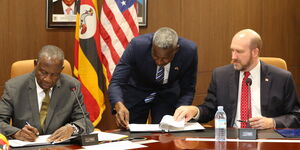The government has approved the extension of the government-to-government petroleum sourcing arrangement with Saudi Arabia.
The decision came following a Cabinet resolution following a meeting held on Tuesday, December 17, at State House Nairobi chaired by President William Ruto.
''The Cabinet has approved the extension of the Government-to-Government (G-to-G) arrangement for the import of refined petroleum products,'' the Cabinet dispatch read in part.
According to the Cabinet, extending the deal was necessary because it has helped ease the pressure on the Kenyan Shilling.
Additionally, the Cabinet revealed that the government-to-government deal has helped stabilise fuel prices in Kenya.
''This arrangement has eased the monthly demand for US dollars for petroleum imports, stabilising the shilling-dollar exchange rate at Ksh129 from a high of Ksh166 and reducing pump prices from Ksh217 per litre of petrol to Ksh177,'' it added.
The extension of the arrangement means that Kenya will continue to access the supply of refined petroleum by allowing payments in Kenya Shillings, previously estimated at $500 million (Ksh65 billion) a month.
However, the Cabinet did not give a clear timeline for when the deal extension will expire.
The decision to extend the deal means that Saudi Aramco, Abu Dhabi National Oil Corporation (ADNOC), and Emirates National Oil Company (ENOC) will continue importing petroleum products into the country on behalf of the government.
However, the decision is likely to spark fiscal wars between the government and the International Monetary Fund (IMF). This is because Kenya informed the international lender on November 6, this year that it intended to exit the deal.
According to documents from the engagement with the IMF, the government of Kenya took the position due to the distortions in the foreign exchange market.
The government also informed the international lender that the accompanying increase in rollover risk of the private sector financing facilities supporting the government-to-government importation deal.
Meanwhile, the Cabinet also approved the procurement of Liquefied Petroleum Gas (LPG), Heavy Fuel Oil, and bitumen through a centrally coordinated bulk procurement system. This follows Ruto's announcement on Monday, December 16, directing that LPG procurement be subjected to the Open Tender System(OTS).












